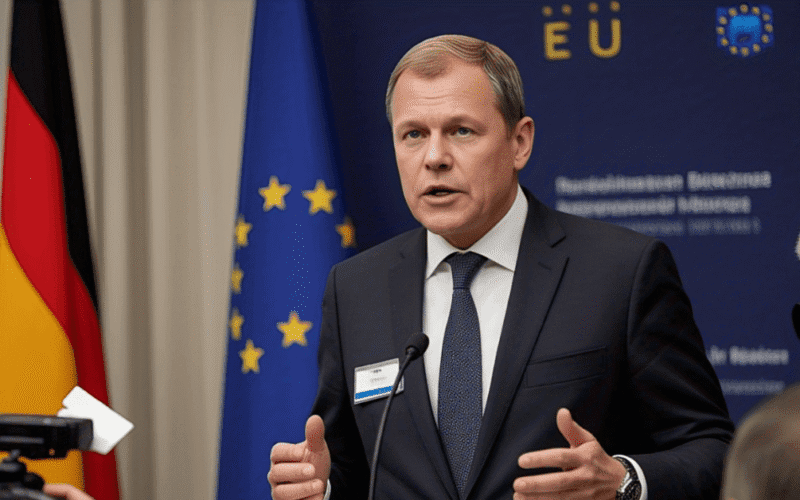German Finance Minister Lars Klingbeil emphasizes the urgency of resolving the escalating U.S.-EU tariff dispute, warning of significant economic repercussions for both economies.(Reuters)
Table of Contents
- Introduction
- Background of the Tariff Dispute
- Economic Implications for Germany and the EU
- Impact on U.S. Economy and Consumers
- Diplomatic Efforts and Negotiations
- Industry Reactions and Concerns
- Potential for Retaliatory Measures
- Conclusion
- Frequently Asked Questions (FAQs)
Introduction
The escalating trade tensions between the United States and the European Union have prompted German Finance Minister Lars Klingbeil to call for a swift resolution. Amid threats of increased tariffs, Klingbeil emphasizes the mutual economic interests at stake and the potential for significant disruptions if the dispute continues unchecked.(Reuters)
Background of the Tariff Dispute
On May 23, 2025, former U.S. President Donald Trump announced plans to impose a 50% tariff on European Union goods starting June 1. This move follows a period of de-escalation and has reignited concerns over a potential trade war. Previously, the White House had paused most tariffs announced in April due to negative market reactions, but a baseline 10% import tax remains in place. (Reuters, Reuters)
Economic Implications for Germany and the EU
Germany, as the EU’s top exporter to the U.S., stands to be significantly affected by the proposed tariffs. In the previous year, Germany exported goods worth €161 billion to the U.S., including automobiles, pharmaceuticals, and machinery. The imposition of a 50% tariff could severely impact these industries, leading to job losses and economic downturns. (Reuters)
German Finance Minister Lars Klingbeil has warned that such tariffs would harm both economies and advocated for a collaborative solution. (Reuters)
Impact on U.S. Economy and Consumers
The proposed tariffs are not only a concern for the EU but also pose risks to the U.S. economy. Higher import costs could lead to increased prices for consumers, particularly for German-made cars, pharmaceuticals, and machinery. This inflationary pressure could dampen consumer spending and slow economic growth. (Reuters)
Moreover, the uncertainty surrounding trade policies may deter investment and disrupt supply chains, further exacerbating economic challenges. (TradingView)
Diplomatic Efforts and Negotiations
In response to the escalating tensions, German Finance Minister Lars Klingbeil met with U.S. Treasury Secretary Scott Bessent on the sidelines of the G7 finance ministers’ meeting in Banff, Canada. Klingbeil expressed optimism about U.S.-German relations following the meeting and confirmed plans for a follow-up meeting in Washington. (Reuters)
Additionally, German Finance Minister Joerg Kukies stated that it is realistic to resolve the trade conflict with the U.S. within the 90-day tariff buffer period implemented by President Trump. (Webull)
Industry Reactions and Concerns
The proposed tariffs have elicited strong reactions from various industry stakeholders. Hildegard Müller of Germany’s VDA auto association stated that the tariffs would “negatively impact car makers, the global supply chain, and consumers in North America.” (Roic AI)
Similarly, the European Automobile Manufacturers’ Association echoed these concerns, highlighting the potential harm to global automakers and U.S. manufacturing operations. With 24% of Germany’s non-EU auto exports destined for American markets, the tariffs threaten an industry that supports nearly 14 million European jobs. (Roic AI)
Potential for Retaliatory Measures
The European Union has indicated that it will respond in kind if the U.S. maintains the proposed tariff hikes. French Finance Minister Eric Lombard stated that the EU would “do the same” if the U.S. follows through with the 25% tariffs announced by President Trump. He emphasized the need to protect EU interests, even though trade wars are detrimental. (Berliner Tageblatt)
Such retaliatory measures could further escalate the trade dispute, leading to a full-blown trade war with significant global economic repercussions.(Roic AI)
Conclusion
The escalating tariff dispute between the U.S. and the EU poses significant risks to both economies. German Finance Minister Lars Klingbeil’s call for a swift resolution underscores the urgency of addressing these challenges through diplomatic means. Failure to resolve the dispute could lead to increased costs for consumers, disrupted supply chains, and a potential global economic downturn.(Reuters)
Frequently Asked Questions (FAQs)
Q1: What are the proposed U.S. tariffs on EU goods?
A: Former U.S. President Donald Trump announced plans to impose a 50% tariff on European Union goods starting June 1, 2025. (Reuters)
Q2: How would these tariffs affect the German economy?
A: Germany, being the EU’s top exporter to the U.S., could face significant economic challenges, including job losses and reduced exports, particularly in the automotive and machinery sectors.
